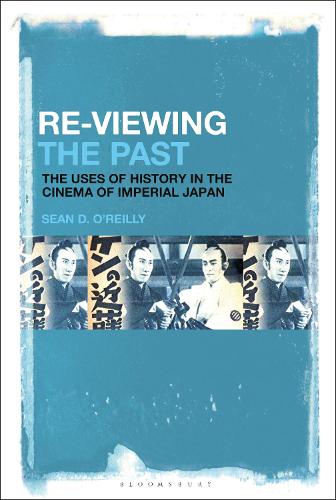
Re-Viewing the Past: The Uses of History in the Cinema of Imperial Japan
(Hardback)
Publishing Details
Re-Viewing the Past: The Uses of History in the Cinema of Imperial Japan
By (Author) Professor Sean D. OReilly
Bloomsbury Publishing PLC
Bloomsbury Academic USA
23rd August 2018
United States
Classifications
Tertiary Education
Non Fiction
Asian history
791.4365852
Physical Properties
Hardback
320
Width 152mm, Height 229mm
599g
Description
Re-Viewing the Past: The Uses of History in the Cinema of Imperial Japan analyzes the complicated relationship between history films, audiences, reviewers and censors in Japan for the critically important years from 1925-1945. First contextualizing the history of the popular Bakumatsu period (1853-1868), the moment of Japans emergence as a modern nation, Sean O'Reilly paves the way for a reinterpretation of Japanese pre and postwar cinema. Setting a film in the Bakumatsu period offered cultural breathing room to both filmmakers and viewers, offering a cinematic space where apolitical entertainment and now-forbidden themes like romance still reigned. Some filmmakersand viewerseven conceived of these films as being a form of resistance against Japans growing militarism. As comparisons between the popularity of such films versus that of state-sponsored propaganda films show, audiences responded enthusiastically to these glimmers of resistance. O'Reilly argues that we should turn our attention to the much more popular films of the time that were major hits with audiences in order to understand what resonated with wartime spectators, and to speculate about why this might have been the case. Including clips of these rare films, a so-far neglected area of Japanese film history is now firmly situated in context to offer a thought-provoking, multidisciplinary approach.
Reviews
OReilly re-views the films produced in transwar Japan through a unique analytical lens. The result is brisk and brilliant; he deciphers an intricate process whereby popular attitudes toward historicity were formulated by filmmakers, filmgoers, politicians, and foreignersan unparalleled contribution to the scholarship on the history of Japan. * Dr. Tomoko L. Kitagawa, author of The Creation of Intelligence: A History of Passion without Borders (2015), The Visions (2013) and Japanese History Abroad (2012) *
In Re-Viewing the Past, Sean OReilly lucidly introduces us to the barely discussed but deeply formative popular cinema of interwar and wartime Japan. Not content with simply mapping an immensely influential body of film, the book expertly re-directs us towards the complex encounters these films offered to audiences at the times. From the bloody tales of assassination, the parodies of patriotism and the adventures of masked heroes emerges a kaleidoscope of possible viewing positions that provides us with a rich view of how film in Japan functioned in negotiating the wrenching present through a specific framing of the tumultuous past. * Alexander Zahlten, Associate Professor of East Asian Languages and Civilizations, Harvard University, USA *
Re-Viewing the Past makes a long-awaited contribution to the scholarship on Japanese period cinema, and Bakumatsu films in particular. Taking a Cultural Studies approach, Sean OReilly brilliantly conjures the multifaceted experiences of contemporary audiences, showing us that interwar/wartime Japan was not, in fact, a gloomy, 'dark valley' as is often claimed. OReillys analysis is witty and elegantly sharp. With its innovative revisionist approach, the book makes a major contribution to both the study of Japanese cinema and audience studies. * Mitsuyo Wada-Marciano, Professor of Film Studies, Kyoto University, Graduate School of Letters, Japan *
Our image of a monolithic, fascist Japan during WWII was partly the product of propaganda cinema from both Japan and the West; the reality was far more complex. Sean OReilly uncovers this complexity by looking at interwar and wartime films representing the Bakumatsu period, the 19th century transition from feudalism to the nation state system. His compelling analyses reveal the wide spectrum of relationships spectators held toward tradition, nation and war. Bakumatsu has recently made a comeback in film and television. OReilly invites us to use the insights of his study to understand how present-day audiences are also re-viewing their collective past. * Markus Nornes, Professor of Asian Cinema, University of Michigan, USA *
Author Bio
Sean D. OReilly is Assistant Professor at Akita International University, Japan, where he teaches courses on Japanese history, cinema, and popular culture. He graduated from Harvard Universitys History and East Asian Languages program with a secondary field in Film and Visual Studies.
